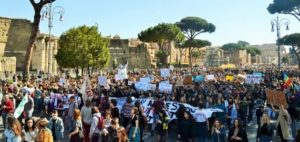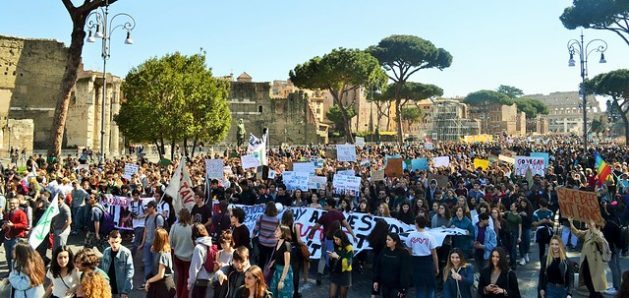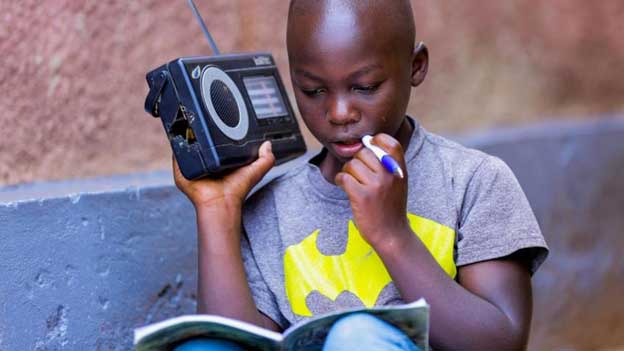
Civil Society, Featured, Global, Headlines, Human Rights, TerraViva United Nations

Thousands of youth gather in Rome on Friday, Mar. 15, 2019 to join the climate strike. Credit: Maged Srour/IPS
– As social distancing, quarantines and lockdowns have spread across the globe to slow the spread of coronavirus, they have imposed some of the greatest worldwide restrictions on public gatherings in living memory. These restrictions may be necessary for public health, but they require the most anxious scrutiny to prevent them being misused to quash legitimate political expression and discriminate against protesters, including children and young people who mobilise.
And while large scale street protests may temporarily be on hold in much of the world, there is an opportunity to rethink how we can protest, expanding online forms of collective activism and developing the protections that must be afforded to children protesting online.
How does coronavirus affect protests?
Children have the same right to protest as adults and they have been exercising this right in the streets with dramatic impact across the world. The global school strike for climate movement, led by Fridays For Future and sparked by Greta Thunberg, has shaped modern climate activism; the social inequality protests in Chile were kickstarted by high school students; the mass demonstrations over the killing of schoolchildren at a rally in Sudan pressured the military regime for reform; the national school walkout to protest gun violence in the United States captured the national debate; and Indian children have been actively involved in protests against the new citizenship law which may render many people stateless.
Under-18s’ right to protest derives mainly from two human rights protected under international law: freedom of expression (the right to express ourselves freely) and freedom of peaceful assembly (the right to peacefully come together with others and express our collective opinions). However, assemblies in the streets have been dramatically curtailed by the emergency measures aimed at stopping the spread of coronavirus. According to the COVID-19 Civic Freedom Tracker, 94 countries currently have measures in place affecting assembly, for example the suspension of events and bans on non-essential movement.
A number of these restrictions are problematic. Some emergency measures expressly discriminate against under-18s. Multiple countries have imposed curfews, including some which apply only to children and young people, for instance in France, Russia, Turkey, Colombia and Bosnia and Herzegovina. Other measures raise suspicions that they may be put in place to stifle political dissent. For example, El Salvador and Kyrgyzstan banned some mass rallies due to coronavirus, despite reporting no cases at the time. Iraq, which has seen the largest and bloodiest anti-government protests since 2003, also prohibited public gatherings.
In this context, some have rightly pointed out, from a language perspective, how the term ‘social distancing’ can be misread by citizens and misused by States as a ban on all public gatherings, including collective activism. However, coronavirus measures are in fact about physical distancing only; socially, people are still connected and politically active, with many exercising their right to protest off the streets, in various settings.
How can under-18s protest when the streets are empty?
Climate activists have suggested a variety of alternatives to street protests, such as cacerolazos (banging on pots and pans or making music) from windows, doors or balconies; webinars; teach-ins (educational forums on current issues); mass call-ins; online storytelling; and artivism workshops. Greta Thunberg encouraged student protesters to join strikes online. On 24 April, Fridays For Future groups in Germany staged the biggest digital demonstration yet, with over 230,000 livestream viewers and 40,000 tweets.
But is an online protest really a protest? Does the label matter?
Yes, it is. Yes, it matters.
We usually think of protests as occasions when people gather together to express their disagreement with something. In thinking this, we make three assumptions: that people gather for a common purpose, that they express their views at roughly the same time and that they come together in a common place. Our experience of protests also means that we readily situate them in public spaces, such as the street.
But in the case of the youth climate strikers, whether they skip (home)school to join a Fridays For Future webinar or share photos of themselves holding placards on social media, school students are still engaged in protests: they have a common purpose and act more or less simultaneously. The only thing that’s changed is the setting of their protest – and for good reason. Greta Thunberg explained that “In a crisis we change our behaviour and adapt to the new circumstances for the greater good of society”.
What the coronavirus pandemic shows us is that we need to question our assumptions. Recognising that protests are held not just in a common physical space, but also for example online, matters. It helps us understand that differing rights concerns arise in different protest settings. That protests allow us to help shape how societies are governed, even in times of crisis, makes this recognition all the more crucial.
What does this mean in practice?
Regarding online protests specifically, national laws need to account for potential risks against access to the internet, dissemination of information and protesters’ privacy and safety.
Perhaps most relevant to younger teenagers who want to protest online, the question of age-based access is significant. Popular social media platforms still impose a minimum age to join, including Facebook, Twitter and Instagram, which all require users to be at least 13 years old. For this reason and more, author and activist Naomi Klein underlined in a recent Talks For Future webinar that young protesters may need to move away from corporate information platforms.
Once online, the question of protesters’ privacy is especially pertinent. In some countries, children are forbidden from taking part in unauthorised protests, including in Russia, so when mobilising online, encryption and anonymity tools are essential to concealing one’s identity in order to avoid government sanctions. Any ban on these tools, such as Iran’s prohibition on encryption technologies through its national legislation, could severely undermine children’s freedom of assembly online.
Meanwhile affecting entire country populations, including under-18s, are national internet shutdowns. Thirty-three countries shut down the internet in 2019, an increase from the 25 that did so in 2018. In most cases it was to curb protests, with governments spuriously citing public safety, fake news and national security concerns.
The worst offenders were India, Venezuela, Yemen, Iraq, Algeria and Ethiopia. Particular sources of information may also be targeted. In Myanmar, for example, the government blocked access specifically to some ethnic media outlets.
In practice under-18s have shown us that collective mobilisation can continue beyond the street, with youth climate protesters in many countries exercising their rights to freedom of expression and freedom of assembly online. But for this to happen in every country, peaceful activism must be protected across the board, no matter what setting it may take place in.
Diana Gheorghiu conducts legal and policy research and analysis at CRIN, the Child Rights International Network



